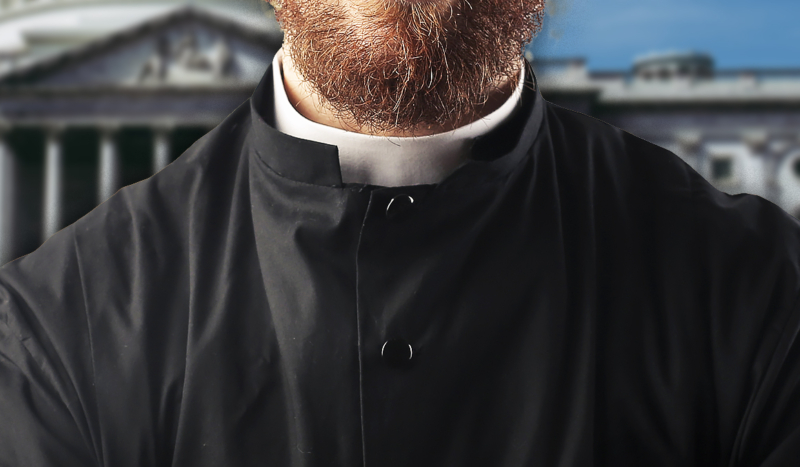
Can priests hold political office? Or endorse a particular candidate or party? What about mentioning Congress in a homily?
While their main duty as our spiritual fathers is to bring us the sacraments and teach Catholic doctrine, let’s dive into what the Church actually teaches about priests’ involvement in politics – and what their obligation is when it comes to forming the faithful.
Holding Public Office
Canon law states that priests, as members of the clergy, are not to participate in activities that are “unbecoming to their state,” (285.1) which includes holding public office.
According to canon 285.3, “Clerics are forbidden to assume public offices which entail a participation in the exercise of civil power.” This rule applies to both elected and appointed offices.
In the past, the 1917 Code of Canon Law stated that clergy were forbidden from holding public office, but stipulated that exceptions could be made with the express permission of their bishop. However in 1980, Pope John Paul II reinforced the tradition that priests could not hold any public office and updated the code to its current status in 1983, excluding the possibility of exceptions.
An American case that arose in the 1970’s may have pushed Pope John Paul II to take this step. Jesuit priest Robert F. Drinan was elected Massachusetts Democratic Representative to Congress in 1971, presumably with permission from his superiors. It was later revealed, however, that Drinan had never received permission and had also repeatedly voted in favor of abortion.
Drinan did not run for office again following Pope John Paul II’s 1980 announcement.
Involvement in Partisan Politics
The clergy has been generally instructed to refrain from engaging directly in partisan politics by either endorsing political candidates or promoting parties. Canon 287.1- 2 mentions that this is primarily because priests are called to “always to foster the peace and harmony based on justice which are to be observed among people.”
The canon further states that this requires clergy “not to have an active part in political parties and in governing labor unions unless, in the judgment of competent ecclesiastical authority, the protection of the rights of the Church or the promotion of the common good requires it.”
Similarly, the Catechism teaches that, “it is not the role of the Pastors of the Church to intervene directly in the political structuring and organization of social life. This task is part of the vocation of the lay faithful, acting on their own initiative with their fellow citizens.” (no. 2442)
Pope John Paul II explained that these prohibitions exist so priests can remain “a central point of spiritual fraternity” for their flock. Partisanship may confuse the faithful and imply that the priest favors members of one party over another is loyal first to a political party rather than his people.
What is the Priest’s Role in Politics?
Based on the guidance provided by the Church, the priest’s role is to always uphold the teachings of the Church and to ensure that the consciences of the laity are well formed. The USCCB affirms that during election times priests should speak out against injustice, and promote the protection of human life, including addressing the moral and human dimensions of public issues.
While explicitly endorsing candidates and political parties is off the table, priests have a responsibility to guide their flock on how to think and act with “the mind of Christ.” That means helping Catholics to understand and apply what the Church teaches when it comes to policies, laws, and leadership.
This role is reinforced in the USCCB’s teaching document “Forming Consciences for Faithful Citizenship,” which urges Catholics to “listen carefully to the Church’s
teachers when we apply Catholic social teaching to specific proposals and situations.”
As the late Pope Benedict XVI stated in his encyclical Deus Caritas Est, the Church “cannot and must not replace the State. Yet at the same time she cannot and must not remain on the sidelines in the fight for justice.”
Priests should always approach political problems that laity face with the intention of pointing out the Church’s position. The goal must be cultivating the faithful’s consciences to make informed decisions.
For instance, if there is a ballot measure on the line that promotes a moral evil, such as abortion or mutilating children, it would be entirely proper for a priest to inform his flock that the policy in question is an attack on the value and dignity of human life that Catholics are obligated to oppose.
Retired Archbishop Charles Chaput contrasts the different political roles that laity and priests are called to, writing in First Things that:
It is the job of Catholic laypeople to change the thinking of their political party and their political leaders with the tools of their Catholic faith. But it is the job of priests to give people those tools to form Catholic laypeople to think and act as disciples of Jesus Christ.
It is well within the priest’s duty as an instructor in the faith to apply moral and social principles to specific situations where policy and laws support or oppose the truth of the faith and the truth about the human person.

